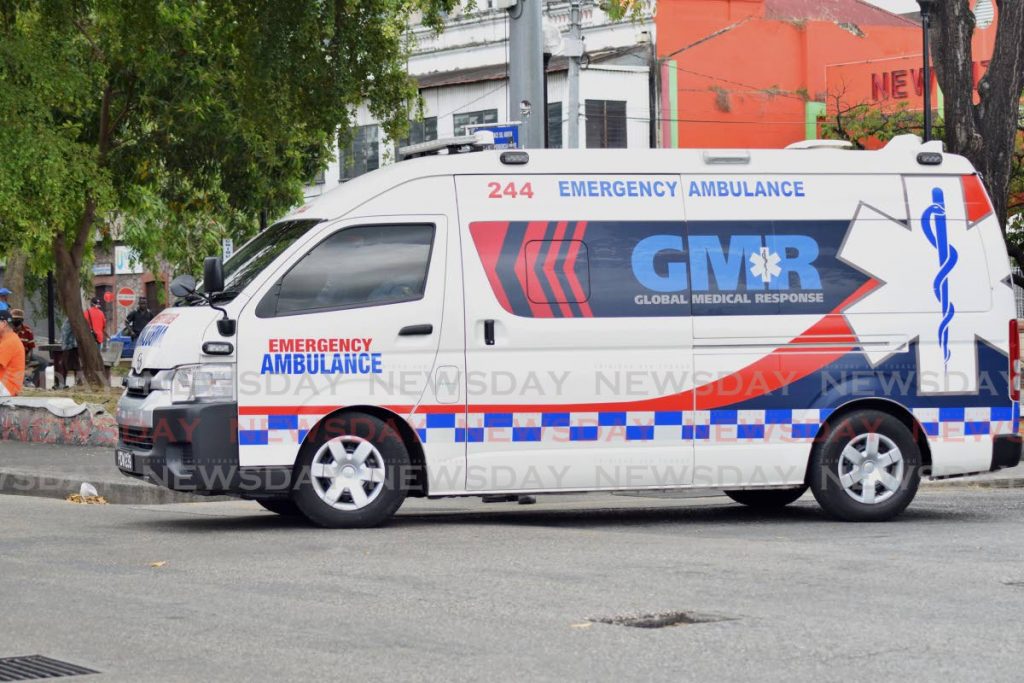Ambulance service CEO: The system is strained

DR Paul Anderson, CEO of the national ambulance service Global Medical Response of TT (GMRTT), is praising its staff on stepping up to the covid19 challenge “well beyond what they are expected to do.”
In an interview with Newsday last week, Anderson said the demand for service has doubled since the start of the pandemic. This, he said, is putting a continuous strain on the system.
He asked members of the public who experience delays to “please understand the personnel on the other end who responded to you have been, for the past 15-16 months, working harder than they have ever been asked to work."
The reason why an ambulance may be delayed, Anderson said, has nothing to do with those crew members.
"The system is being stressed and is working at maximum capacity. We are doing everything possible that we can to ensure we step it up and provide the services required."
GMRTT is the exclusive provider of emergency ambulance services to TT, under a contract with the Ministry of Health.
Anderson explained, dealing with covid19 patients compared to non-covid19 patients requires additional time.
Workers must put on personal protective equipment (PPE), and there is a process for decontaminating ambulances after each use.
On some occasions, covid19 cases require up to three times the normal operational time, he said.
Anderson referred to the Spanish flu, also known as the 1918 influenza pandemic. Considering that generation is gone, he said, this pandemic is unprecedented.
"As I pointed out to my staff, this is a generational event. Whatever stage they are in life, at one point they are going to look back and tell their children and grandchildren about this pandemic and how they contributed to the national response."
GMRTT has 330 workers and about 19 people in training.
Anderson said the company shifts resources to where the calls are occurring or where it expects them to happen.
GMRTT is now recruiting the next intake of emergency medical technicians (EMT) trainees. The company also has advertisements inviting applications for certified EMTs to join its team.
"We normally have regular recruitment for training. It is a continuous process," Anderson said. "It takes time to train people, and not many people are rushing to do this type of work."
He said the movement of people generates calls. Because of the latest covid restrictions, GMRTT has received fewer calls for non-covid19-related incidents like people accidentally hurting themselves. The increase in demand is directly related to covid19.
He noted that the pandemic has caused people to suffer emotionally, financially, and psychologically.
On workers protecting themselves and others from the virus, the CEO said each worker goes through a health screening process before reporting to work.
Anderson also said the company has policies in place to maintain communication and support.
"We have to be very careful that people do not become overworked. The staff have been contributing as much as possible for the past 15-16 months. In the last six weeks, it has intensified.
"We are handling the situation to the best of our ability. It has been a challenge, and it has stressed people, the system, and resources."
On the availability of PPE, Anderson recalled that since the Ebola outbreak about seven years ago, the company had saved some cash specifically for that.
GMRTT started in "a good place" last year in terms of having an available supply of PPE, Anderson said. Some was sourced from overseas as well as from its parent company in the US.
He repeatedly expressed his appreciation for his staff members.
Anderson urged the country to follow the covid19 regulations.
"Stay at home. Do not go out unless you absolutely have to. When the vaccines are offered to you, please take them. All the vaccines offered to us in TT are safe. I took my first shot."
The ambulance service is free to anyone in need of transport in case of a medical emergency. The toll-free number is 811.

Comments
"Ambulance service CEO: The system is strained"